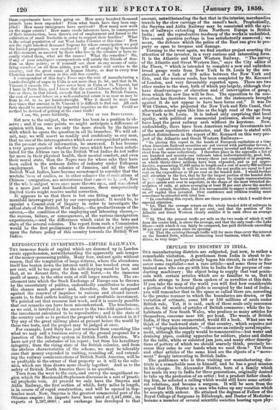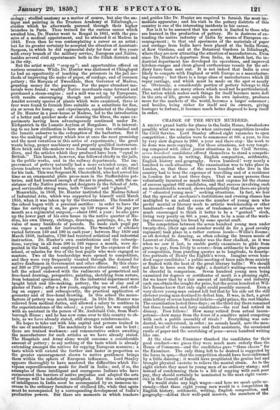IMPULSE TO INDUSTRY IN INDIA.
OUR manufacturing districts are subjected, just now, to rather a remarkable visitation. A gentleman from India is about to in- vade them, has perhaps already begun his circuit, in order to dis- cover some capitalist—not a rare article—and some three or four trained men who can go with him to India for the purpose of con- ducting machinery ; the object being to supply that vast penin-
sula with certain articles which are so fa 'liar to us, that it sounds strange to hear them spoken of as novelties at this date. If you take the map of the world you will find how considerable a portion of the terrestrial globe is occupied by the land of India; you will remember that in the space so called there are, according to the precise manner in which the boundaries are drawn, or the variation of estimate, some 100 or 150 millions of souls under British rule. Yet, it is said, each of these souls only consumes about 6s. 6d. worth of articles of British commerce ; while the in- habitants of New South Wales, who produce so many articles for themselves, consume near 101. per head. The wants of British India, if they were enumerated, would fill a book. What can we think of the backward state of that country, which requires not only "telegraphic insulators,"—those are an entirely novel require- ment,. although the supply would be remunerative—but water and draining pipes, cooking apparatus for soldiers, plates and dishes for the table, white or coloured jam jars, and many other descrip- tions of pottery of which we should scarcely think, precisely be- cause they come to our hands when we need them ? Yet these and other articles of the same kind are the objects of a "move- ment" deeply interesting to British India.
The gentleman who is thus visiting our manufacturing dis- tricts is a remarkable man in himself, and he has a good mission in his charge. Dr. Alexander Hunter, born of a family which has made its way in India for three generations, originally desired to take up the profession of an artist ; but a prudent father check- ing him, he selected a calling which would still have some artisti- cal relations, and became a surgeon. It will be seen from the sequel that Jr. Hunter is a man who takes up any vocation which he accepts with ardour. He attained the degrees of Fellow of the Royal College of Surgeons in Edinburgh, and Doctor of Medicine ; became a member of several scientific societies bearing upon phy-
siology ; studied anatomy as a matter of course, but also the an- tique and painting in the Trustees Academy at Edinburgh,—
studies which he afterwards pursued through their higher branches in Paris. Thus trained for the curious career which awaited him, Dr. Hunter went to Bengal in 1841, with the pro- mise of a medical appointment, and he attained it at Madras in 1843. Even then he was contemplating a career as an artist; but for its greater certainty he accepted the situation of Assistant- Surgeon, in which he did regimental duty for four or five years, with every branch of the military service, European and Native, besides several civil appointments both in the Zillah districts and in the city.
But the artist would "crop up"; and opportunities offered on various occasions. While Dr. Hunter was stationed at Chingleput
he had an opportunity of teaching the prisoners in the jail me- thods of improving the make of paper, of cordage, and of common pottery ; the Marquis of Tweedclale, then Governor of Madras, granting money for the purpose. For the paper abundant ma- terials were found ; wealthy Native merchants came forward and purchased a steam-engine ; and a mill was set up by Europeans, with results encouraging though not perfectly satisfactory. Amidst seventy species of plants which were examined, three or four were found to furnish fibre suitable as a substitute for flax, six or seven for hemp ; and experiments, canducted at the charge of Dr. Hunter in a poor-house at Madras, led to the introduction of a better and quicker mode of cleaning the fibres the stkme ex- periments having been advantageously continued under Dr. Kirkpatrick in the Lunatic Asylum at Bangalore. It is interest- ing to see how civilization is here making even the criminal and the lunatic subserve to the redemption of the barbarian. But it was the making of pottery which was at once the most promising and the most vexatious in this series of experiments ; the great wants being, proper machinery and properly qualified instructors. Mere brick and tile-makers were found among the European sol- diers and the articles which they produced have been equal to
British." This branch, however, was followed chiefly in the jails,
in the public works and in the railway departments. The im- provement of pottery naturally had a more extended scope, and eleven teachers were tried before one could be found at all fitted for his task. This was Sergeant M. Chesterfield, who had served his time as an ornamental plate press-man in the Staffordshire pot-
teries and had learned enough of the art to produce with the as- sistance of the Native potters and designers in the School of Arts, good serviceable strong ware' both " biscuit " and "glazed." Meanwhile' in 1850, Dr. Hunter instituted the Madras School of Industrial Arts, which was supported by himself until March
1855, when it was taken up by the Government. The founder of the school began with a personal sacrifice : in order to have the time for carrying it on, he gave up 150 rupees of his pay per month as a regimental surgeon,—about 1801. a year ; he also gave up the lower part of his own house in the native quarter of Ma- dras, his own library, etchings, drawings, paintings &c., to the value of many hundreds of pounds. He made each pupil pay one rupee a month for instruction. The +number of scholars varied between 150 and 180 in each year • between May 1850 and March 1858, inclusive 1760 had teceived artistica' and industrial instruction. Dr. Hunter's own contributions and the subscrip- tions, varying in all from 300 to 360 rupees a month, were de- posited in the bank, and employed to pay for the expenses of the school, or salaries for five of the best pupils who were engaged as masters. Two of the teacherships were opened to competition, and they were very frequently vacated through the demand for native draftsmen in Government and other offices. By this chan- nel 260 or 270 pupils secured remunerative situations; and they left the school endowed with the rudiments of geometrical and free-hand drawing, perspective, painting, sketching from nature, from botanical specimens, &c. In the industrial department were taught brick and tile-making, pottery, the use of clay and of plaster of Paris ; after a few years, engraving on wood, and etch- ing on copper ; and subsequently, the practical application of geometry and of free-hand drawing. In this school the manu- facture of pottery was much improved. In 1854 Dr. Hunter was relieved from medical duties and allowed a salary to continue in the superintendence of the school ; a year later, he was supplied with an assistant in the person of Mr. Archibald Cole, from Marl- borough House ; and he has now come over to this country to ob- tain, as we have already stated, still stronger reinforcements. He hopes to take out with him capital and persons trained in the use of machinery. The machinery is there and can be lent ; there are trained workmen: and remunerative orders awaiting the manufacturer for such articles as we have already stated. The Hospitals and Army alone would consume a considerable amount of pottery ; to say nothing of the taste which is already extending amongst the natives for copying European manners; a taste which will extend the further and faster in proportion as the greater encouragement shown to native gentlemen brings
them within the sphere of European influences. Lord Stanley appears thoroughly to have mastered the difficulties which Eu-
ropean superciliousness made for itself in India ; and, if so the examples of those intelligent and courageous Indians who /lave surmounted the barriers of native prejudice and adopted the arts
of Europe will be indefinitely multiplied. But this enlargement of intelligence in India must be accompanied by an immense in- crease to the ordinary furniture of civilized life, while that again
must be accompanied by a corresponding development of India's productive powers. But there are moments in which teachers and guides like Dr. Hunter are required to furnish the most im- mediate apparatus ; and his visit to the pottery districts of this country is one of the interesting incidents in his career.
Nor is it to be assumed that his search is limited to those who are learned in the production of pottery. He is desirous of ex- tending the native industry of India by means of European en- couragement; to that end specimens of the materials of 'paper and cordage from India have been placed at the India House, at Kew Gardens, and at the Botanical Gardens in Edinburgh, where they are now attracting the attention of manufacturers. Even since Dr. Hunter's departure from India, in March last, the in- dustrial department has developed its operations, and improved kitchen-ranges and clean glazed earthenware vessels for the sol- diery have been sent out. It is not indeed that India is ever likely to compete with England or with Europe as a manufactur- ing country ; but there is a large class of manufactures which ill repay carriage, and which must be made on the spot or nearly so. Obviously, a considerable portion of pottery belongs to this class, and there are many others which need not be particularized. The nation which makes such things for itself becomes more deft in the arts of life, grows capable in its own industry, produces more for the markets of the world, becomes a larger consumer; and besides, being richer for itself and its owners, giving hostages to fortune, it becomes much better disposed to keep itself in order.



























 Previous page
Previous page